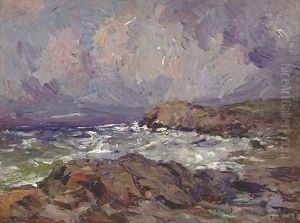Aleksandr Evgen'evich Yakovlev Paintings
Aleksandr Evgen'evich Yakovlev, also known as Alexander Yevgenievich Yakovlev, was a Russian artist renowned for his draughtsmanship and a career that spanned the tumultuous years of the Russian Revolution and the early Soviet period. Born on April 2, 1887, in Saint Petersburg, Russia, Yakovlev was a prominent figure of his time, associated with the neoclassical and realist movements. His work often reflected an interest in different cultures and was marked by a strong sense of design and an exceptional ability to capture the essence of his subjects.
Yakovlev studied at the Imperial Academy of Arts in Saint Petersburg and was a student of the famous Russian painter Ilya Repin. He was also a contemporary of other notable Russian artists such as Igor Grabar and Nicholas Roerich. During this period, he participated in various exhibitions and his talent was recognized with awards, including a scholarship that allowed him to travel abroad. His travels took him to Italy, Spain, and North Africa, where he was exposed to a variety of artistic styles and cultural influences.
The Russian Revolution of 1917 and the subsequent civil war greatly affected Yakovlev's career. Like many of his contemporaries, he emigrated from Russia and eventually settled in Paris, France. In Paris, he became part of the Russian émigré community and continued to work as an artist. His Parisian period was marked by a fascination with Asian culture, and he is particularly noted for his depictions of Chinese opera performers and African figures, as well as scenes from his travels.
Yakovlev's work during the 1920s and 1930s was well-received, and he participated in several important exhibitions, including the Venice Biennale. He worked in various media, including painting, graphic art, and illustration, and also designed sets and costumes for the theater. Despite his success abroad, Yakovlev remained relatively unknown in the Soviet Union due to his emigrant status and the official Soviet art policies that favored Socialist Realism.
Aleksandr Evgen'evich Yakovlev's artistic legacy is characterized by his mastery of form and line, his ethnographic interest in different peoples and cultures, and his ability to adapt and evolve his style throughout his career. He died on May 15, 1938, in Paris. Today, his works can be found in several museum collections, including the Russian Museum in Saint Petersburg and various institutions in France and other countries. Although he is not as widely recognized as some of his contemporaries, Yakovlev remains an important figure in the history of Russian art, particularly for his contributions to the understanding and appreciation of cultural diversity through his paintings.
